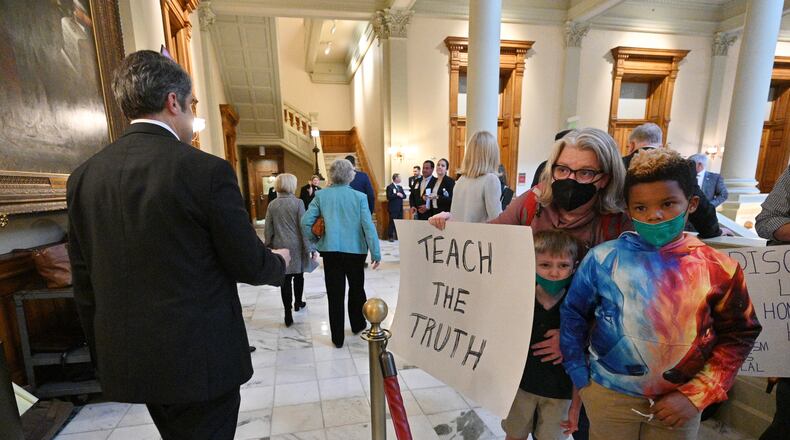In the 2022 legislative session, Georgia Republicans passed incendiary education bills designed to invigorate their bedrock voters. The bills reveal the willingness of this Legislature and governor to exploit ginned-up fears of conservative white parents that schools are becoming woke boot camps where their kids learn about LGBTQ relationships, Black Lives Matter and white privilege.
These bills threaten the progress Georgia has made in diversifying the Statehouse and the schoolhouse. It’s not a coincidence that the misinformation campaign that Georgia schools taught critical race theory followed the election of Georgia’s first Black and Jewish American senators, and as Confederate monuments fell across the country.
“In all of the General Assemblies that have convened and met to govern this wonderful state of Georgia, this one ranks with one of the worst I have ever seen,” said Allen Fort, superintendent of Taliaferro County Schools. “It truly reflects our polarizing politics, self and small group interests.”
The most troubling legislation was the classroom ban on divisive concepts, a list drawn from a 2020 executive order by then-President Donald Trump. House Bill 1084 aimed to placate voters who don’t want their children exposed to the concept of white privilege and feel that U.S. history should not dwell on race or racism.
“It is going to create a chilling effect where educators feel they are unable to have honest discussions with children in the classroom,” said state Rep. Bee Nguyen, D-Atlanta.
For a glimpse of that chilling effect, look to states like Florida that already limit what schools can teach about race. Lisa McNair, a civil rights advocate and sister of Denise McNair, one of the four little girls killed in the 1963 bombing of 16th Street Baptist Church in Alabama, was on a speaking tour last month in Florida. One school district declined her offer to speak to students about her family’s story over fear of running afoul of Florida’s law. Another school allowed her to speak but forbade student questions because of the same concern.
In their last hours, lawmakers tacked on an amendment that creates an oversight committee for the Georgia High School Association. That committee will likely push the question of whether trans girls can play on female high school teams, a determination now left to schools. Robin Hines, the association’s executive director, said the board of trustees could take up the issue in the next few months.
“It’s clear that this creates a path forward for possible restrictions on who can play sports in our state. But there’s a lot that’s still unknown about the implications of the bill,” said Jeff Graham, executive director of Georgia Equality. “We remain hopeful that the oversight committee and the Georgia High School Association will ensure that there is no harm done to transgender kids in Georgia, who simply want the opportunity to play sports with their peers.”
Despite Georgia Gov. Brian Kemp’s contention that these bills prioritize students, their voices were ignored by the Legislature. Jalen Connor was one of the dozens of high schoolers who came to the Capitol to oppose the divisive concept bill. She signed up in advance to testify and traveled four hours from her home in Savannah. But the committee chair decreed there was no time to hear from her or the other students.
Later, the 18-year-old shared what she had hoped to tell legislators: “HB 1084 silences the voices of the students you claim to be protecting. But what are you protecting them from exactly? The bill talks about banning divisive concepts being taught in the classroom when in actuality these concepts do not exist.”
Georgia Tech student Alex Ames spoke at several hearings to remind lawmakers there was real work to be done. “Right now, there are Georgia students who go to schools named after Confederate generals. There are classrooms without enough teachers or textbooks to make it through the year, and there are hundreds of thousands of children learning in poverty. To neglect these issues while simultaneously rewriting the history that got us here is disgraceful,” she said.
Another bill pitting parents against teachers is Kemp’s Parents’ Bill of Rights, which reasserts the rights of aggrieved parents to complain about oversight, transparency and instructional materials. Since parents already have that right, this bill was more political theater.
Recognizing their need to redeem themselves to teachers, lawmakers approved a $2,000 educator raise. The raises are supposed to show that Kemp and other state leaders value teachers, but the legislation enacted this session makes clear they don’t trust them.
About the Author


